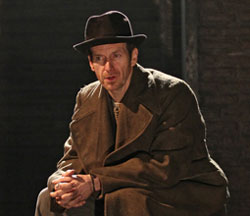Theater Review : “An Iliad” — War’s All Greek to Me
Simultaneously storyteller and player, ancient character and modern respondent, Denis O’Hare’s performance of An Iliad elicits the kind of respect automatically granted this genre of demanding monologual performance.
An Iliad by Denis O’Hare and Lisa Peterson. Directed by Lisa Peterson. Scenic design by Rachel Hauck. Costumes by Marina Draghici. Lighting by Scott Zielinkski. Presented by Homer’s Coat and Arts Emerson at the Paramount Center Mainstage, Boston, MA, through May 4.
By Debra Cash
The first word of Homer’s Iliad is Rage.
The first word of Denis O’Hare and Lisa Peterson’s An Iliad is probably rage, too, but it is spoken in classical Greek (which I don’t understand) by a despondent man in a fedora and dingy coat sitting on a battered suitcase. The room—the disclosed, back wall of the Paramount Theatre—is furnished with random items: a desk, a ladder, raw stage, and lighting equipment. We, the audience, are literally going to be taken on a visit behind the scenes for a stripped-down journey into the Western literary canon and will be confronted with a vision of what happens when rage combusts into totalizing war.
Denis O’Hare—the actor who collaborated with director Lisa Peterson on An Iliad over a period of five years, and who is most recognizable for his turn as 3,000-year-old vampire Russell Edgington on HBO’s True Blood—takes huge swaths of Robert Fagles‘s celebrated, 1990 English translation and retells key episodes in the story of the Trojan War. The coauthors make An Iliad a story about every war, paraphrasing John Kerry’s famous Congressional testimony as a leader of Vietnam Veterans Against the War, drawing a straight line to today’s unresolved American campaigns.
Simultaneously storyteller and player, ancient character and modern respondent, O’Hare’s performance of An Iliad elicits the kind of respect automatically granted this genre of demanding monologual performance (all that memorizing! all those switches of tone!). But O’Hare doesn’t aim for the kind of seamless impersonation perfected by Anna Deavere Smith. The omniscient narrator—call him Homer or O’Hare, it doesn’t matter which—remains front and center.
That theatrical strategy has its drawbacks. O’Hare can be archly colloquial (“Achilles is back in the game”), dip into banality by asking the audience to recall how frustrated and stubborn people act when they’re standing in stalled grocery lines, and then rear back and declaim as if he were doing a voiceover for the History Channel. When he depicts the triangulated lives of his protagonists—Achilles, Patroclus, and Hector—he inhabits them fully and movingly, but slights both the minor human characters and the gods.
As they wend their narrative way through the play’s 100 uninterrupted minutes, O’Hare and Peterson beat a persuasive drum for their own interpretations but don’t leave much room for their audience to develop independent insights about how the ancient tale prefigures, not to mention challenges, its present-day analogues.
What O’Hare does get brilliantly right is the rhythmic, even rhapsodic shape of his telling, which yields extravagant rewards by An Iliad‘s climactic moments, where he inventories a depressingly exhaustive catalog of wars fought over time and in every corner of the planet. His speeches are amplified and shadowed by the very effective presence of bassist Brian Ellingsen stationed at the edge of the stage, playing composer/sound designer Mark Bennett’s musical illustrations.
During Sunday afternoon’s post-show conversation with David Elmer, classicist Madeline Miller, whose novel Song of Achilles won the 2012 Orange Prize, noted that there has been a resurgence of interest in The Iliad, with three new translations published in recent years. That’s no accident, she said: “Wherever war goes, The Iliad seems to follow—or maybe it’s the other way around.”
c 2013 Debra Cash

